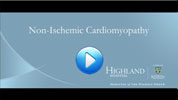Cardiomyopathy
Cardiomyopathy is a generic term which means weakening or decreased pumping function of the heart leading to reduced ability to deliver blood to the organs, muscles and other tissues of the body.
Cardiomyopathy is broadly divided into two categories:
 Ischemic Cardiomyopathy (weakening of the heart caused by heart attacks or blockages in the arteries of the heart)
Ischemic Cardiomyopathy (weakening of the heart caused by heart attacks or blockages in the arteries of the heart)
 Non-Ischemic Cardiomyopathy (weakening of the heart due to viruses, inflammation, medications, toxins or any other factor other than blockages or heart attack)
Non-Ischemic Cardiomyopathy (weakening of the heart due to viruses, inflammation, medications, toxins or any other factor other than blockages or heart attack)
Normal heart function, or ejection fraction (EF) is 55-65%, meaning that with each beat, the heart pumps 55-65% of the blood inside the heart to the rest of the body. Cardiomyopathy implies decrease in EF to less than 50% (which is considered borderline or low normal.)
Symptoms
-
Shortness of breath
-
Edema or swelling
-
Fatigue, especially with exertion
-
Unexplained weight gain
-
Shortness of breath when lying down
Diagnostic tests
Treatment
-
Beta-blockers (atenolol, metoprolol, carvedilol, etc) can relax the heart, lower blood pressure and slow the heart to improve filling and pumping function.
-
ACE-inhibitors (lisinopril, enalapril, etc) or ARB’s (losartan, candesartan, etc) can also lower blood pressure, relax the heart and improved blood flow to the kidney.
-
Diuretics may be used to remove excess fluid.
-
Spironolactone can also be used to remove fluid and help relax the heart.
-
Occasionally stents or bypass surgery may be beneficial.
-
Pacemakers or defibrillators may be recommended in some cases.
-
Other treatments may be considered depending on the cause of the cardiomyopathy.
Print this information
For Additional Information